人教版九年级英语Unit1-Unit12单元知识点复习资料.
- 格式:doc
- 大小:320.10 KB
- 文档页数:20
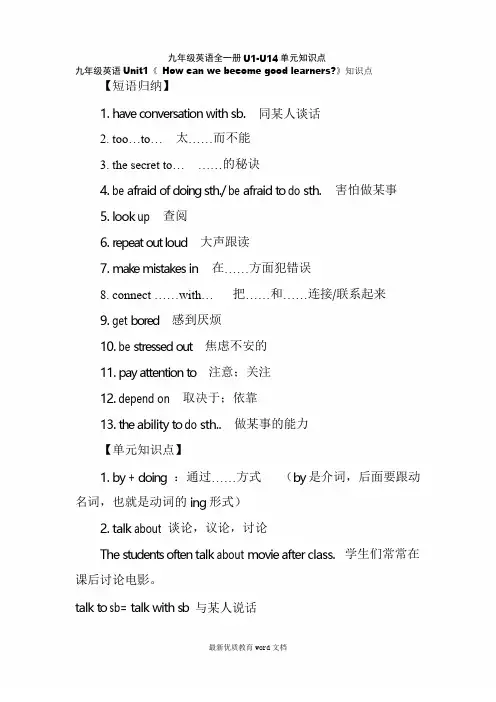
九年级英语全一册U1-U14单元知识点九年级英语Unit1《How can we become good learners?》知识点【短语归纳】1.have conversation with sb.同某人谈话2.too…to…太……而不能3.the secret to………的秘诀4.be afraid of doing sth./be afraid t o do sth.害怕做某事5.look up查阅6.r epeat o ut loud大声跟读7.mak e mistakes in在……方面犯错误8.connect……with…把……和……连接/联系起来9.get b or ed感到厌烦10.be stressed out焦虑不安的11.pay attention t o注意;关注12.depend on取决于;依靠13.the ability t o do sth..做某事的能力【单元知识点】1.by+doing:通过……方式(by是介词,后面要跟动名词,也就是动词的ing形式)2.talk about谈论,议论,讨论The students often talk about movie after class.学生们常常在课后讨论电影。
talk t o sb=talk with sb与某人说话(3. 提建议的句子:①What/ how about +doin g sth.?做…怎么样?(about 后面要用动词的 ing 形式,这一点考试考的比较多)如:What/ How about going shopping?②Why don 't you + do sth.?你为什么不做…?(注意加黑的部分用的是动词的原型)如:Why don 't you go shopping?③Why n ot + do sth. ?为什么不做…?(注意加黑的部分用的是动词的原型)如:Why n ot go shopping?④Let's + do sth.让我们做…吧。
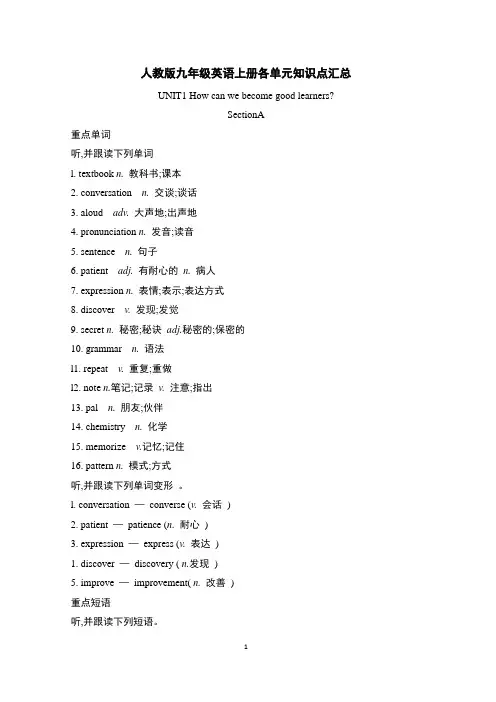
人教版九年级英语上册各单元知识点汇总UNIT1 How can we become good learners?SectionA重点单词听,并跟读下列单词l. textbook n.教科书;课本2. conversation n.交谈;谈话3. aloud adv.大声地;出声地4. pronunciation n.发音;读音5. sentence n.句子6. patient adj.有耐心的n.病人7. expression n.表情;表示;表达方式8. discover v.发现;发觉9. secret n.秘密;秘诀adj.秘密的;保密的10. grammar n.语法l1. repeat v.重复;重做l2. note n.笔记;记录v.注意;指出13. pal n.朋友;伙伴14. chemistry n.化学15. memorize v.记忆;记住16. pattern n.模式;方式听,并跟读下列单词变形。
l. conversation —converse (v.会话)2. patient —patience (n.耐心)3. expression —express (v.表达)1. discover —discovery ( n.发现)5. improve —improvement( n.改善)重点短语听,并跟读下列短语。
l. make word cards 制作单词卡片2. ask sb. for ... 向某人寻求……3. have conversations with sb. 和某人谈话4. at first 起初, 起先5. give a report 做报告6. take notes 记/做笔记7. word by word 逐词地8. so... that 如此……以至于9. write e-mails to sb. 给某人写电子邮件10. be afraid to do sth. /be afraid of doing sth.害怕做某事11. because of 由于;因为12. fall in love with 爱上13. a piece of cake 小菜一碟14. look up( 在词典、参考书中或通过电脑)查阅;抬头看15. so that 以便重点句型听,并跟读下列句子。
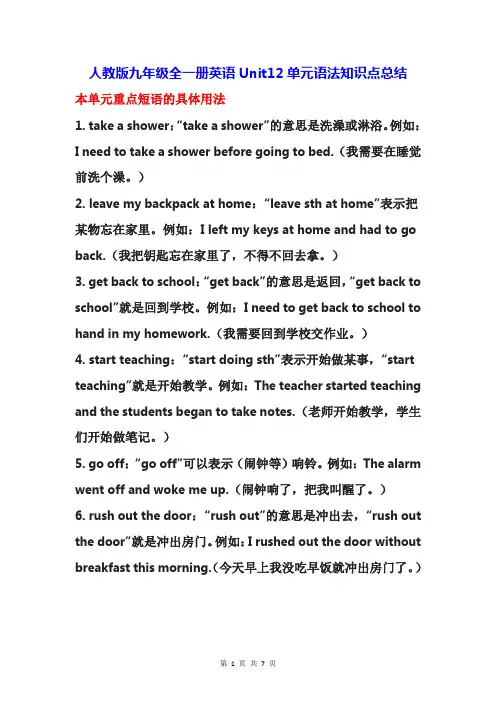
人教版九年级全一册英语Unit12单元语法知识点总结本单元重点短语的具体用法1. take a shower:“take a shower”的意思是洗澡或淋浴。
例如:I need to take a shower before going to bed.(我需要在睡觉前洗个澡。
)2. leave my backpack at home:“leave sth at home”表示把某物忘在家里。
例如:I left my keys at home and had to go back.(我把钥匙忘在家里了,不得不回去拿。
)3. get back to school:“get back”的意思是返回,“get back to school”就是回到学校。
例如:I need to get back to school to hand in my homework.(我需要回到学校交作业。
)4. start teaching:“start doing sth”表示开始做某事,“start teaching”就是开始教学。
例如:The teacher started teaching and the students began to take notes.(老师开始教学,学生们开始做笔记。
)5. go off:“go off”可以表示(闹钟等)响铃。
例如:The alarm went off and woke me up.(闹钟响了,把我叫醒了。
)6. rush out the door:“rush out”的意思是冲出去,“rush out the door”就是冲出房门。
例如:I rushed out the door without breakfast this morning.(今天早上我没吃早饭就冲出房门了。
)7. give sb a lift:“give sb a lift”的意思是让某人搭车、捎某人一程。
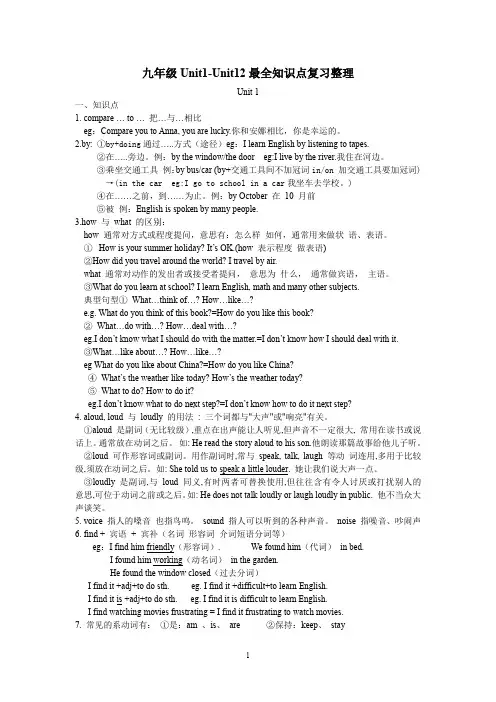
九年级Unit1-Unit12最全知识点复习整理Unit 1一、知识点1. compare … to … 把…与…相比eg:Compare you to Anna, you are lucky.你和安娜相比,你是幸运的。
2.by: ①by+doing通过…..方式(途径)eg:I learn English by listening to tapes.②在…..旁边。
例:by the window/the door eg:I live by the river.我住在河边。
③乘坐交通工具例:by bus/car (by+交通工具间不加冠词in/on 加交通工具要加冠词)→(in the car eg:I go to school in a car我坐车去学校。
)④在……之前,到……为止。
例:by October 在10 月前⑤被例:English is spoken by many people.3.how 与what 的区别:how 通常对方式或程度提问,意思有:怎么样如何,通常用来做状语、表语。
①How is your summer holiday? It’s OK.(how 表示程度做表语)②How did you travel around the world? I travel by air.what 通常对动作的发出者或接受者提问,意思为什么,通常做宾语,主语。
③What do you learn at school? I learn English, math and many other subjects.典型句型①What…think of…? How…like…?e.g. What do you think of this book?=How do you like this book?②What…do with…? How…deal with…?eg.I don’t know what I should do with the matter.=I don’t know how I should deal with it.③What…like about…? How…like…?eg What do you like about China?=How do you like China?④What’s the weather like today? How’s the weather today?⑤What to do? How to do it?eg.I don’t know what to do next step?=I don’t know how to do it next step?4. aloud, loud 与loudly 的用法: 三个词都与"大声"或"响亮"有关。
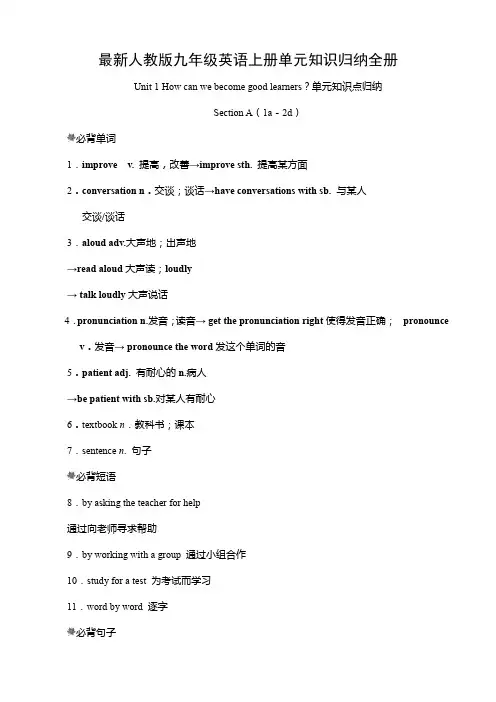
最新人教版九年级英语上册单元知识归纳全册Unit 1 How can we become good learners?单元知识点归纳Section A(1a-2d)必背单词1.improve v. 提高,改善→improve sth. 提高某方面2.conversation n.交谈;谈话→have conversations with sb. 与某人交谈/谈话3.aloud adv.大声地;出声地→read aloud大声读;loudly→ talk loudly大声说话4.pronunciation n.发音;读音→ get the pronunciation right使得发音正确;pronounce v.发音→ pronounce the word发这个单词的音5.patient adj. 有耐心的n.病人→be patient with sb.对某人有耐心6.textbook n.教科书;课本7.sentence n. 句子必背短语8.by asking the teacher for help通过向老师寻求帮助9.by working with a group 通过小组合作10.study for a test 为考试而学习11.word by word 逐字必背句子12. I've learned a lot that way. 我用那种方法学到很多。
13. It really improves my speaking skills.它确实提高了我的口语能力。
14. It's too hard to understand spoken English.听懂英语口语很难。
15.It takes time.这需要时间。
16. The more you read,the faster you'll be.你读得越多,你将会越快。
Section A(3a-4c)必背单词1. expression n.表情;表示;表达方式→ express v.表达;表露2.discover v. 发现;发觉→discovery n.发现3.repeat v. 重复;重做4.secret n.秘密;秘诀adj.秘密的;保密的5.note n.笔记;记录→ take notes 记笔记v.注意;指出6.physics n.物理;物理学7.chemistry n. 化学8.grammar n. 语法必背短语9.be afraid to害怕10. fall in love with 爱上……11.look up (在词典或参考书中)查阅;抬头看→look it up12. because of因为必背句子13.The teacher spoke so quickly that I did not understand her most of the time.老师说得太快,以至于很多时候我都听不懂。
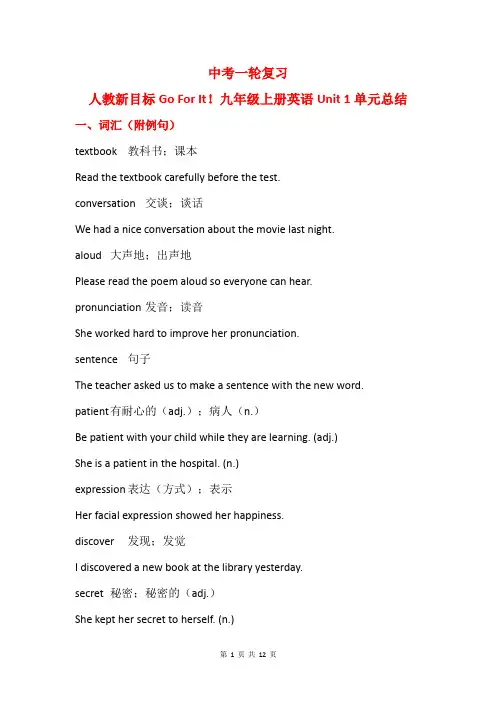
中考一轮复习人教新目标Go For It!九年级上册英语Unit 1单元总结一、词汇(附例句)textbook教科书;课本Read the textbook carefully before the test.conversation交谈;谈话We had a nice conversation about the movie last night.aloud大声地;出声地Please read the poem aloud so everyone can hear.pronunciation发音;读音She worked hard to improve her pronunciation.sentence句子The teacher asked us to make a sentence with the new word. patient有耐心的(adj.);病人(n.)Be patient with your child while they are learning. (adj.)She is a patient in the hospital. (n.)expression表达(方式);表示Her facial expression showed her happiness.discover发现;发觉I discovered a new book at the library yesterday.secret秘密;秘密的(adj.)She kept her secret to herself. (n.)This is a secret room in the house. (adj.)grammar语法I need to brush up on my grammar skills.repeat重复;重做Repeat the steps carefully to avoid mistakes.note笔记;记录(n.);注意;指出(v.)She took notes during the lecture. (n.)Please note that the deadline is next Friday. (v.)pal朋友;伙伴(非正式用语)My best pal and I have been friends since childhood.pattern模式;方式He found a pattern in the data that helped him solve the problem. physics物理学I enjoy studying physics because it's interesting.chemistry化学Chemistry is the study of matter and its interactions.partner搭档;同伴We worked on the project as partners.memorize记住;熟记Memorize these key points for the exam.increase增加;增长The population has increased significantly in recent years.speed速度(n.);加速(v.)She drove at a high speed on the highway. (n.)He sped up the car to pass the slow traffic. (v.)ability能力;才能She has a natural ability for music.brain大脑The brain is the control center of the body.active活跃的;积极的She is an active member of the school club.attention注意;关注Pay attention to the details of the problem.connect连接;与……有联系(v.);连接(n.)Connect the wires correctly to avoid sparks. (v.)The internet allows us to connect with people around the world. (n.) overnight一夜之间;在夜间The project was completed overnight by a team of experts.review回顾;复习She spent the evening reviewing her notes for the test. knowledge知识;学问She has a wealth of knowledge in ancient history.wisely明智地;聪明地He made a wise decision to invest in that company.二、短语知识(附例句)by making word cards 通过制作单词卡片释义:这是一种学习新单词的方法,通过制作卡片来加深记忆。
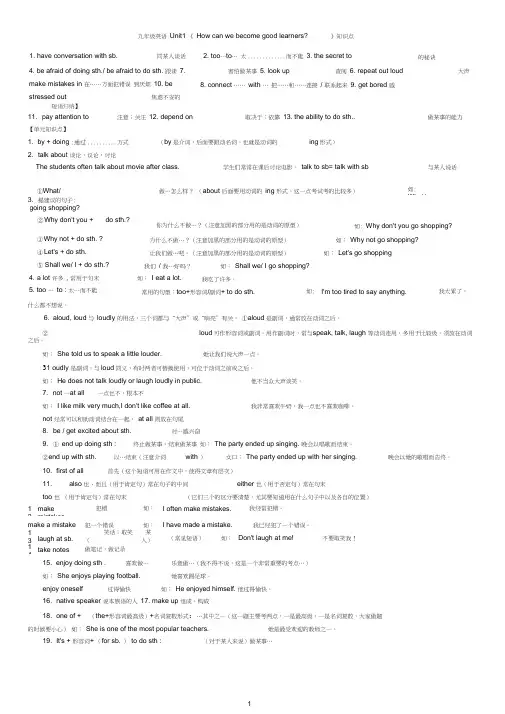
九年级英语 Unit1 《 How can we become good learners?》知识点短语归纳】11. pay attention to注意;关注 12. depend on取决于;依靠 13. the ability to do sth..做某事的能力【单元知识点】1. by + doing :通过 .......... 方式 (by 是介词,后面要跟动名词,也就是动词的 ing 形式)2. talk about 谈论,议论,讨论The students often talk about movie after class.学生们常常在课后讨论电影。
talk to sb= talk with sb与某人说话3. 提建议的句子:什么都不想说。
6. aloud, loud 与 loudly 的用法,三个词都与“大声”或“响亮”有关。
①aloud 是副词,通常放在动词之后。
② loud 可作形容词或副词。
用作副词时,常与 s peak, talk, laugh 等动词连用,多用于比较级,须放在动词之后。
如: She told us to speak a little louder.她让我们说大声一点。
31 oudly 是副词,与loud 同义,有时两者可替换使用,可位于动词之前或之后。
如: He does not talk loudly or laugh loudly in public.他不当众大声谈笑。
7. not …at all一点也不,根本不如: I like milk very much,I don't like coffee at all.我非常喜欢牛奶,我一点也不喜欢咖啡。
not 经常可以和助动词结合在一起, at all 则放在句尾 8. be / get excited about sth. 对…感兴奋9. ① end up doing sth :终止做某事,结束做某事 如: The party ended up singing. 晚会以唱歌而结束。
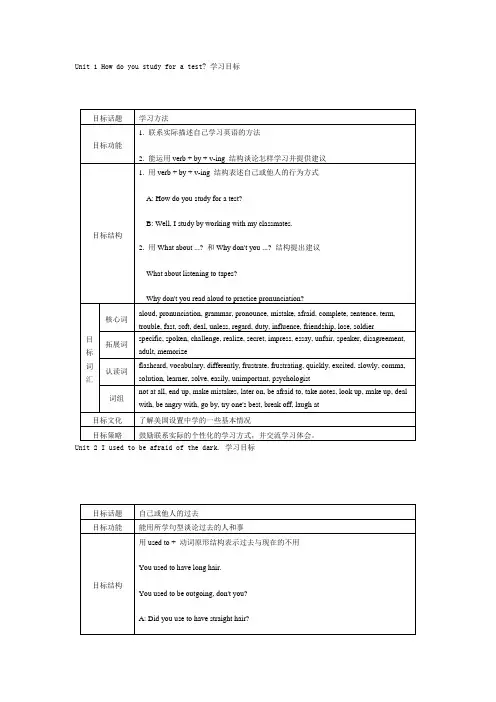
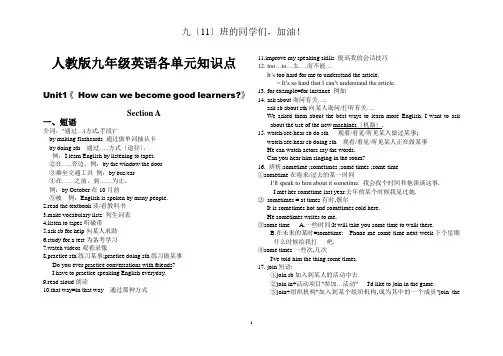
人教版九年级英语各单元知识点Unit1《How can we become good learners?》Section A一、短语介词,“通过…(方式,手段)”by making flashcards 通过做单词抽认卡by doing sth 通过…..方式〔途径〕。
例:I learn English by listening to tapes.②在…..旁边。
例:by the window/the door③乘坐交通工具例:by bus/car④在……之前,到……为止。
例:by October在10月前⑤被例:English is spoken by many people.2.read the textbook读/看教科书3.make vocabulary lists 列生词表4.listen to tapes听磁带5.ask sb for help向某人求助6.study for a test为备考学习7.watch videos观看录像8.practice sth练习某事;practice doing sth练习做某事Do you ever practice conversations with friends?I have to practice speaking English everyday.9.read aloud朗读10.that way=in that way通过那种方式11.improve my speaking skills 提高我的会话技巧12. too…to…太….而不能…It’s too hard for me to understand the article.= It’s so hard that I can’t understand the article.13. for example=for instance 例如14. ask about询问有关…;ask sb about sth向某人询问/打听有关….We asked them about the best ways to learn more English. I want to ask about the use of the new machines〔机器〕.15. watch/see/hear sb do sth 观看/看见/听见某人做过某事;watch/see/hear sb doing sth 观看/看见/听见某人正在做某事He can watch actors say the words.Can you hear him singing in the room?16. 辨析:sometime ;sometimes ;some times ;some time①sometime在将来/过去的某一时间I’ll speak to him about it sometime. 我会找个时间和他谈谈这事.I met her sometime last year.去年的某个时候我见过她.②sometimes = at times有时,偶尔It is sometimes hot and sometimes cold here.He sometimes writes to me.③some time A.一些时间:It will take you some time to walk there.B.在未来的某时=sometime: Phone me some time next week下个星期什么时候给我打吧.④some times一些次,几次I've told him the thing some times.17. join短语:①join sb加入到某人的活动中去②join in+活动项目"参加…活动" I'd like to join in the game.③join+组织机构"加入到某个组织机构,成为其中的一个成员"join theParty〔党〕; join the League〔团〕,The best way to improve your English is to join an English club.18. have fun 玩得高兴19. not at all 一点也不20. get excited 高兴、激动21. end up (vi.) 结束; 告终; 结果; 最后end up doing sth.We end up taking a taxi there .我们结果乘出租车去了那里.We sometimes end up speaking in Chinese.(以说汉语结束对话)22. do a survey 做调查;do a survey about针对…做调查I'm doing a survey about learning English. 我在进行学习英语的调查。
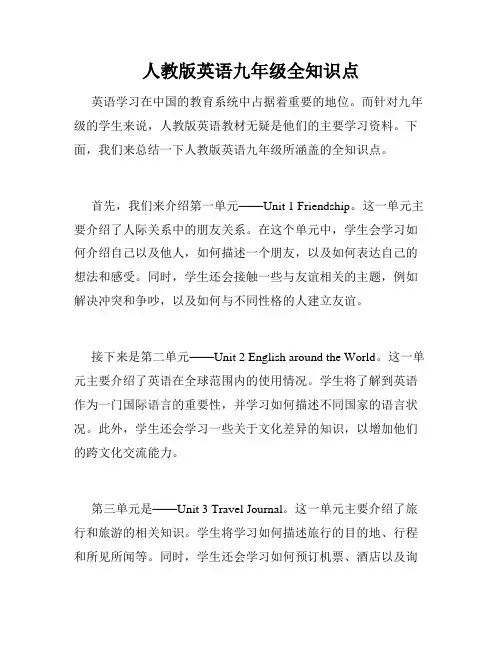
人教版英语九年级全知识点英语学习在中国的教育系统中占据着重要的地位。
而针对九年级的学生来说,人教版英语教材无疑是他们的主要学习资料。
下面,我们来总结一下人教版英语九年级所涵盖的全知识点。
首先,我们来介绍第一单元——Unit 1 Friendship。
这一单元主要介绍了人际关系中的朋友关系。
在这个单元中,学生会学习如何介绍自己以及他人,如何描述一个朋友,以及如何表达自己的想法和感受。
同时,学生还会接触一些与友谊相关的主题,例如解决冲突和争吵,以及如何与不同性格的人建立友谊。
接下来是第二单元——Unit 2 English around the World。
这一单元主要介绍了英语在全球范围内的使用情况。
学生将了解到英语作为一门国际语言的重要性,并学习如何描述不同国家的语言状况。
此外,学生还会学习一些关于文化差异的知识,以增加他们的跨文化交流能力。
第三单元是——Unit 3 Travel Journal。
这一单元主要介绍了旅行和旅游的相关知识。
学生将学习如何描述旅行的目的地、行程和所见所闻等。
同时,学生还会学习如何预订机票、酒店以及询问和提供旅行信息的表达方式。
通过这个单元的学习,学生将提升自己的旅行英语能力。
第四单元是——Unit 4 Growing up。
这一单元主要讲述了人的成长过程。
学生将学习如何描述他们的童年回忆,以及描述他人的外貌和个性特点。
此外,学生还将接触一些与年龄和人生阶段相关的话题,例如青少年时期的压力和挑战,以及如何解决这些问题。
接下来是第五单元——Unit 5 Amazing Women。
这一单元主要介绍了一些杰出的女性以及她们的成就。
通过学习这些女性的故事,学生将了解到女性在社会中扮演的重要角色,并且激励他们追求自己的梦想。
第六单元是——Unit 6 Festivals around the World。
这一单元主要介绍了全球各地的节日。
学生将学习如何描述不同节日的庆祝活动,以及了解一些关于节日的文化和传统。
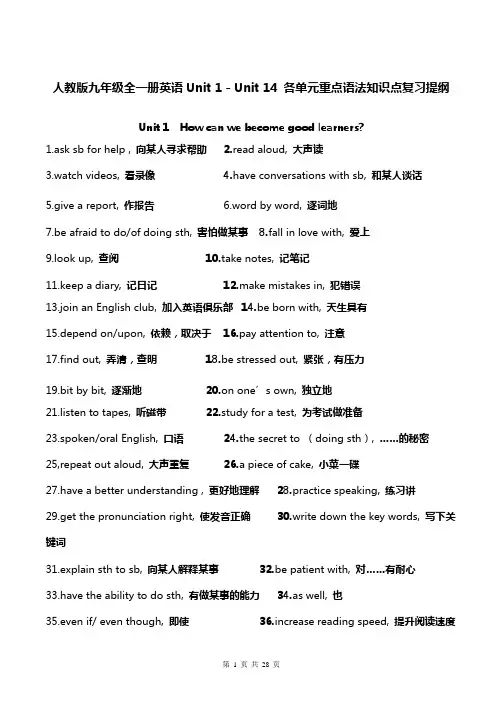
人教版九年级全一册英语Unit 1-Unit 14 各单元重点语法知识点复习提纲Unit 1 How can we become good learners?1.ask sb for help , 向某人寻求帮助2.read aloud, 大声读3.watch videos, 看录像4.have conversations with sb, 和某人谈话5.give a report, 作报告6.word by word, 逐词地7.be afraid to do/of doing sth, 害怕做某事8.fall in love with, 爱上9.look up, 查阅10.take notes, 记笔记11.keep a diary, 记日记12.make mistakes in, 犯错误13.join an English club, 加入英语俱乐部14.be born with, 天生具有15.depend on/upon, 依赖,取决于16.pay attention to, 注意17.find out, 弄清,查明18.be stressed out, 紧张,有压力19.bit by bit, 逐渐地20.on one’s own, 独立地21.listen to tapes, 听磁带22.study for a test, 为考试做准备23.spoken/oral English, 口语24.the secret to (doing sth), ……的秘密25,repeat out aloud, 大声重复26.a piece of cake, 小菜一碟27.have a better understanding , 更好地理解28.practice speaking, 练习讲29.get the pronunciation right, 使发音正确30.write down the key words, 写下关键词31.explain sth to sb, 向某人解释某事32.be patient with, 对……有耐心33.have the ability to do sth, 有做某事的能力34.as well, 也35.even if/ even though, 即使36.increase reading speed, 提升阅读速度37.be interested in/create an interest in, 对…感兴趣38.finish doing sth, 完成某事How to Learn English WellEnglish is important and useful to us. How can we learn it well? Here are my suggestions.First, we should often listen to the tapes, English songs and programs. Watching English movies is also helpful to us.Second, we should speak English in class as much as possible. Don't be afraid of making mistakes. The more you speak, the fewer mistakes you'll make. We'd better join the English club and practice with others.Third, we can read more English newspapers and magazines. It's good for us. At last, we should recite some good passages and keep diaries.In a word, as long as we do more listening, reading and writing, we will learn English well.Unit 2 I think that moon cakes are delicious!1. put on (put on a play 上演戏剧), 增加(体重);发胖;穿上2. be similar to, 与……相似= take after3. throw... at..., 把……抛向/泼向/洒向……4. wash away, 冲掉;冲走5. in the shape of..., 呈……的形状6. shoot down, 射下7. fly up to..., 飞到……8. call out, 叫喊;大声说出9. as a result, 结果10.be crowded with......, 挤满了...... y out, 摆放,放置12.admire sb. for doing sth., 钦佩某人做某事13. dress up as, 装扮;乔装打扮14. play a trick/joke on..., 开……的玩笑15. on business, 出差16.punish sb. for sth., 因某事惩罚某人17.warn sb. of sth., 警告某人某事18.warn sb(not)to do sth., 警告某人(不)做某事19.at present, 目前20. care about, 关心;在意21. used to do sth., 过去常常做某事22. end up doing sth, 最终成为;最后处于23. remind sb. of..., 使某人想起……24.remind sb to do sth, 提醒某人做某事25. wake up, 醒来26.in need 在困难中27.give birth to, 分娩,出生30.make/earn money, 赚钱31.promise to do sth, 承诺做某事32.eat out , 外出吃饭33.treat sb with sth , 用某物招待某人34.the spirit of , ……的精神35.not only…but also(谓语动词遵循就近就近原则), 不仅…而且36.spread…around, 到处传播37.in two weeks (用how soon 提问), 两周之后38.make/have/let sb do sth, 让某人做某事39.take/show sb around, 带领某人参观40.be popular with/among, 在……当中受欢迎作文1:端午节Dear Jack,How's it going?I am very glad to introduce the Dragon Boat Festival to you.①It is one of the Chinese traditional festivals which has a history of about two thousand years.②We all know that the festival is celebrated to honor the great poet Qu Yuan. On that day,people often get together with their family to eat zongzi and some other delicious food. In southern parts of China,people often have the Dragon Boat races. It is so exciting to watch this activity on TV. Besides,we also have a 3-day holiday during the festival.So we can have a short journey to relax ourselves.③How interesting the Dragon Boat Festival is and I like it very much.Best wishes.Yours,Li Hua 作文2:春节Dear Jim,I’m very glad to tell you something about the Chinese Spring Festival. It’s a traditional festival in China. It usually comes in January or February.Before the Spring Festival, people usually clean and decorate their houses carefully. They put on Spring Festival couplets on their doors. On New Year’s Eve, people set off fireworks and light candles to wait for the New Year to come.During the Spring Festival, everyone goes home to get together with their families. They visit relatives and have dinner together. When the kids greet their grandparents, they can get lucky money. That’s one of my favorite parts of the festival.That’s one of the most interesting festivals! I hope you can come to celebrate it with us some day!Yours,Li Hua Unit 3 Could you please tell me where the restrooms are?1.get some information about…, 得到…的信息2.go along, 沿着…走3.turn left/right, 向左/向右拐4.go past/pass by, 路过;经过5.start/begin with , 从…开始6.ask for help politely, 礼貌地寻求帮助7.lead into, 导入;引入8.in a rush, 匆忙9.pardon me, 抱歉;什么;再说一遍10.on the third floor , 在三楼11.be excited to do sth., 做某事是兴奋的12.look scary , 看上去可怕13.You don’t need to rush. , 你没有必要慌。
九年级英语Unit1-Unit12知识汇总⼈教新⽬标版九年级英语Unit1-Unit12知识汇总Unit11. by + doing通过……⽅式如:by studying with a group2. talk about 谈论,议论,讨论talk to sb. === talk with sb. 与某⼈说话3.ask for…要求,寻求4.read aloud朗读5.spoken/written English英语⼝语/书⾯英语6.be afraid of…害怕…be afraid to do sth.害怕做…7. not …at all ⼀点也不根本不8. be / get excited about s对…感兴奋9. ①end up doing sth 终⽌做某事,结束做某事②end up with sth. 以…结束10. first of all ⾸先. to begin with ⼀开始later on 后来、随后11.have trouble doing sth.做某事费劲/困难12. make mistakes in(在…⽅⾯)犯错13. laugh at sb. 笑话;取笑(某⼈)14. take notes 做笔记,做记录15. enjoy doing sth .喜欢做enjoy oneself 过得愉快16.look up查阅,look for寻找, look after照顾,look at看, have a look at看⼀看, looklike看起来像,look over(医⽣)检查17. make up 组成、构成20. practice doing 练习做某事21. decide to do sth.=make a decision to do sth. 决定做某事25. be angry with sb. 对某⼈⽣⽓26.for long= for a long time(长时间)27. go by (时间) 过去28. see sb. / sth. doing看见某⼈正在做某事强调正在发⽣see sb. / sth. do看见某⼈在做某事如: She saw him drawing a picture in the classroom.她看见他正在教室⾥画画。
人教版九年级英语全册(Unit 1-Unit 13)知识点归纳Unit 1 How can we become good learners?短语总结:1. good learners 优秀的学习者2. work with friends 和朋友一起学习3. study for a test 备考4.have conversations with 与……交谈5.speaking skills 口语技巧6.a little 有点儿7.at first 起初起先8.the secret to......, .......的秘诀9.because of 因为10.as well 也11.look up (在词典中等)查阅;抬头看12.so that 以便,为了13.the meaning of ……的意思14.make mistakes 犯错误15.talk to 交谈16.depend on 依靠依赖17.in common 共有的18.pay attention to 注意关注19.connect ……with ……把……联系。
20.for example 例如21.think about 考虑22.even if 即使尽管纵容23.look for 寻找24.worry about 担心担忧25.make word cards 制作单词卡片26.ask the teacher for help 向老师求助27.read aloud 大声读28.spoken english 英语口语29.give a report 作报告30.word by word 一字一字地31.so……that 如此……以至于32.fall in love with 爱上33.something interesting 有趣的事情34.take notes 记笔记35.how often 多久一次36.a lot of 许多37.the ability to do sth. 做某事的能力38.learning habits 学习习惯39.be interested in 对……感兴趣40.get bored 感到无聊41.be good at 在……方面擅长42.be afraid of 害怕43.each other 彼此互相44.instead of 代替而不是二.用法集萃1. by doing sth 通过做某事2.it +be+adj+to do sth 做某事是……的3.finish doing sth 完成某事4.what about doing sth?做某事怎么样?5.try to do sth 尽力做某事6.the +比较近,the+比较近越……,就越……7.find it+adj+to do sth 发现做某事8.be afraid of doing sth 害怕做某事9.help sb (to) do sth 帮助某人做某事10.practice doing sth 练习做某事11.keep doing sth 一直做某事12.be afraid to do sth 害怕做某事13.begin to do sth 开始做某事14.want to do sth 想要做某事15.need to do sth 需要做某事16.remember to do sth 记得做某事17.shoot 射(射着,射死等表结果)18.shoot at(瞄准)射书面表达(一)假如你是张晓华,下面是你的笔友李军给你写的一封电子邮件。
九年级英语单元知九年级英语单元知识点识点复习资料Unit 1Section A一、短语1.by介词,“通过…(方式,手段)”by making flashcards 通过做单词抽认卡by doing sth 通过…..方式(途径)。
例:I learn English by listening to tapes.②在…..旁边。
例:by the window/the door③乘坐交通工具例:by bus/car④在……之前,到……为止。
例:by October在10月前⑤被例:English is spoken by many people.2.read the textbook读/看教科书3.make vocabulary lists 列生词表4.listen to tapes听磁带5.ask sb for help向某人求助6.study for a test为备考学习7.watch videos观看录像8.practice sth练习某事;practice doing sth练习做某事Do you ever practice conversations with friends?I have to practice speaking English everyday.9.read aloud朗读10.that way=in that way通过那种方式11.improve my speaking skills 提高我的会话技巧12. too…to…太….而不能…It’s too hard for me to under stand the article.= It’s so hard that I can’t understand the article.13. for example=for instance 例如14. ask about询问有关…;ask sb about sth向某人询问/打听有关….We asked them about the best ways to learn more English. I want to ask about the use of the new machines(机器).15. watch/see/hear sb do sth 观看/看见/听见某人做过某事;watch/see/hear sb doing sth 观看/看见/听见某人正在做某事He can watch actors say the words.Can you hear him singing in the room?16. 辨析:sometime ;sometimes ;some times ;some time ①sometime在将来/过去的某一时间I’ll speak to him about it sometime. 我会找个时间和他谈谈这事.I met her sometime last year.去年的某个时候我见过她.② sometimes = at times有时,偶尔It is sometimes hot and sometimes cold here.He sometimes writes to me.③some time A.一些时间:It will take you some time to walk there. B.在未来的某时=sometime: Phone me some time next week下个星期什么时候给我打电话吧.④some times一些次,几次I've told him the thing some times.17. join短语:①join sb加入到某人的活动中去②join in+活动项目"参加…活动" I'd like to join in the game.③join+组织机构"加入到某个组织机构,成为其中的一个成员"join the Party (党); join the League(团),The best way to improve your English is to join an English club.18. have fun 玩得高兴19. not at all 一点也不20. get excited 高兴、激动21. end up (vi.) 结束; 告终; 结果; 最后end up doing sth.We end up taking a taxi there .我们结果乘出租车去了那里.We sometimes end up speaking in Chinese.(以说汉语结束对话) 22. do a survey 做调查;do a survey about针对…做调查I'm doing a survey about learning English. 我在进行学习英语的调查。
23. keep an English notebook 记英语笔记二、重点知识1. by + doing通过……方式如:by studying with a groupby 还可以表示:“在…旁”、“靠近”、“在…期间”、“用、”“经过”、“乘车”等如:I live by the river. I have to go back by ten o’clock.The thief entered the room by the window.The student went to park by bus.2. talk about 谈论,议论,讨论如:The studentsoften talk about movie after class.学生们常常在课后讨论电影。
talk to sb. === talk with sb. 与某人说话3. 提建议的句子:①What/ how about +doing sth.?如:What/ How about going shopping?②Why don’t you + do sth.?如:Why don’t you go shopping?③Why not + do sth. ? 如:Why not go shopping?④Let’s + do sth. 如:Let’s go shopping⑤Shall we/ I + do sth.?如:Shall we/ I go shopping?4. a lot 许多常用于句末如:I eat a lot. 我吃了许多。
5.too…to 太…而不能常用的句型too+adj./adv. + to do sth.如:I’m too tired to say anything. 我太累了,什么都不想说。
6. aloud, loud与loudly的用法三个词都与"大声"或"响亮"有关。
①aloud是副词,重点在出声能让人听见,但声音不一定很大,常用在读书或说话上。
通常放在动词之后。
aloud没有比较级形式。
如: He read the story aloud to his son.他朗读那篇故事给他儿子听。
②loud可作形容词或副词。
用作副词时,常与speak, talk,laugh等动词连用,多用于比较级,须放在动词之后。
如: She told us to speak a little louder.她让我们说大声一点。
③loudly是副词,与loud同义,有时两者可替换使用,但往往含有令人讨厌或打扰别人的意思,可位于动词之前或之后。
如: He does not talk loudly or laugh loudly in public. 他不当众大声谈笑。
7.not …at all 一点也不根本不如:I like milk very much. I do n’t like coffee at all.我非常喜欢牛奶。
我一点也不喜欢咖啡。
not经常可以和助动词结合在一起,at all 则放在句尾8. be / get excited about sth.= be / get excited about doing sth.= be excited to do sth. 对…感兴奋如:I am / get excited about going to Beijing.= I am excited to go to Beijing. 我对去北京感到兴奋。
9. ①end up doing sth 终止做某事,结束做某事如:The party ended up singing. 晚会以唱歌而结束。
②end up with sth. 以…结束如:The party ended up with her singing. 晚会以她的歌唱而告终。
Section B一、短语1.spoken English英语口语;written English书面英语2.make mistakes/make a mistake犯错误3.get the pronunciation right 使发音准确4.practice speaking English 练习说英语5.first of all 首先6.to begin with一开始ter on 随后8. be afraid to do因为害怕而不敢做某事I'm afraid to speak in class. 9. in class 在课堂上 ugh at sb 嘲笑某人;laugh at sth 因为某事而发笑 11.make sentences 造句 12.辨析: too , also , either: too, also 用于肯定句 ,疑问句; also 用于行前be 后,情后助后 ; either 用于否定句,置句末 13.decide to do sth 决定做某事 14.take notes 做笔记15.have trouble doing sth 在…方面有困难If you have some trouble spelling new words , you can look them up in the dictionary.16. enjoy doing 喜欢干 17. be impressed 深受感动 18.write down 写下、记下 19.look up (v-adv ) “查字典 ” 20. feel+形容词 “感觉起来…”21. native speakers 说本族话的人 22. make up 组成、构成 23. as 当作…Most people speak English as a second language. You can use the book as your textbook. Regard problems as challenges.24. around the world 全世界=all over the world1. 首先. 一开始 后来、随后也、而且(用于肯定句)常在句子的中间 也(用于否定句)常在句末 (用于肯定句) 常在句末 犯错如:I often make mistakes. 我经常犯错。